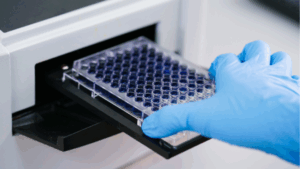How to Choose the Best ELISA Kit
Introduction
Selecting the best ELISA kit for your research isn’t always straightforward. With so many options available, researchers need to ensure their chosen kit delivers reliable, reproducible, and biologically relevant results. The most critical factor? Antibody validation. Poorly validated antibodies can compromise sensitivity, specificity, and reproducibility – leading to wasted time and research funds.

Antibody Validation Matters
At the core of any ELISA are the antibody pairs it’s built from. Inconsistent or poorly characterised antibodies are one of the leading causes of failed assays and irreproducible results. In fact, antibody validation has been a major focus in the scientific community since 2016, when the International Working Group on Antibody Validation proposed five “pillars” for antibody validation in research【Nature Methods†】.
Many leading suppliers now adopt rigorous validation strategies. For example:
- Cloud-Clone applies CRISPR/Cas9 knock-out cell lines to confirm antibody specificity.
- Rockland contributed to shaping global guidelines on antibody validation.
Choosing ELISAs from suppliers that embrace these validation practices gives confidence in your results.
Sensitivity: Detecting the Right Target
Sensitivity is crucial for identifying native, correctly folded proteins in complex biological samples. Poor sensitivity often stems from antibodies raised against recombinant proteins or short synthetic peptides, which may lack proper folding or post-translational modifications.
Tip: If in doubt, check whether the ELISA has been cited in peer-reviewed publications detecting native targets.
Specificity: Reducing Cross-Reactivity
Specificity ensures antibodies bind only the target antigen. Problems like cross-reactivity (binding to similar but unintended proteins) or interference (other sample substances blocking antibody binding) can cause false positives.
Tip: Choose ELISAs validated for your sample type and tested with both positive and negative controls.
Reproducibility: Consistency Across Batches
Reliable results require reproducibility. Reputable manufacturers perform lot-to-lot validation, comparing new antibody lots against previous batches to maintain consistent performance.
Tip: Ask your supplier for the lot number validation report before ordering - this ensures both intra-assay and inter-assay precision.
Conclusion
When choosing the best ELISA kit, focus on antibody validation, sensitivity, specificity, and reproducibility. Selecting kits from suppliers committed to rigorous validation standards not only safeguards your data but also maximises research productivity.
At Millennium Science, we work with suppliers leading the way in antibody standardisation and ELISA validation. Whether you’re studying cytokines, growth factors, or disease biomarkers, we can help you find the right kit for your target.
👉 Contact us to explore validated ELISA kits for your research needs.